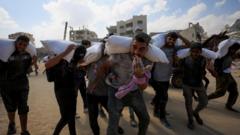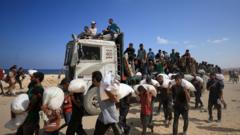Israel’s recent decision to deny the visa renewal for Jonathan Whittall, a senior United Nations humanitarian official, has intensified scrutiny of the country’s humanitarian policies in Gaza. Whittall, who has been critical of Israel's military actions impacting civilians, is not alone in facing this dilemma as his predecessor also left under similar circumstances.
Israel Bars Senior UN Official from Gaza Visa Amidst Ongoing Humanitarian Crisis

Israel Bars Senior UN Official from Gaza Visa Amidst Ongoing Humanitarian Crisis
Israel's refusal to renew the visa of a top UN humanitarian official heightens tensions over aid in Gaza and reflects the complexities of the ongoing conflict.
In a statement made by Israel's Foreign Minister Gideon Saar, the government cited Whittall’s “biased and hostile conduct against Israel” as justification for the refusal. Saar's comments come amidst ongoing fury over Israel's military campaign against Hamas, which has resulted in significant loss of life and humanitarian challenges in the affected regions. The UN's Office for the Coordination of Humanitarian Affairs (OCHA), responsible for managing aid deliveries, expressed that the difficulties in communicating the realities on the ground are a fundamental part of their mission.
The situation in Gaza remains dire. Reports indicate severe escalations in violence, including a recent incident in which Israeli forces opened fire at a border crossing, leading to casualties among Palestinians. The ongoing conflict, ignited by the Hamas-led attack on Israel in October 2023, has been devastating, with the death toll in Gaza exceeding 57,000 according to local health authorities.
Critically, the humanitarian crisis includes widespread displacement, with many Gazans suffering from extreme hunger. The World Food Program has revealed alarming statistics, indicating nearly one-third of the population is facing intermittent food scarcity. Whittall's remarks characterized the dire situation as "weaponized hunger" and "a death sentence for civilians."
With persistently tense relations between Israel and various humanitarian bodies, this recent development raises pressing concerns about the future of aid in Gaza and the protection of civilians caught in the crossfire of prolonged conflict. As calls for a change in approach intensify, the international community watches closely to see how these dynamics unfold.
Aaron Boxerman is a journalist covering the Israel-Gaza conflict. He reports from Jerusalem.
The situation in Gaza remains dire. Reports indicate severe escalations in violence, including a recent incident in which Israeli forces opened fire at a border crossing, leading to casualties among Palestinians. The ongoing conflict, ignited by the Hamas-led attack on Israel in October 2023, has been devastating, with the death toll in Gaza exceeding 57,000 according to local health authorities.
Critically, the humanitarian crisis includes widespread displacement, with many Gazans suffering from extreme hunger. The World Food Program has revealed alarming statistics, indicating nearly one-third of the population is facing intermittent food scarcity. Whittall's remarks characterized the dire situation as "weaponized hunger" and "a death sentence for civilians."
With persistently tense relations between Israel and various humanitarian bodies, this recent development raises pressing concerns about the future of aid in Gaza and the protection of civilians caught in the crossfire of prolonged conflict. As calls for a change in approach intensify, the international community watches closely to see how these dynamics unfold.
Aaron Boxerman is a journalist covering the Israel-Gaza conflict. He reports from Jerusalem.





















